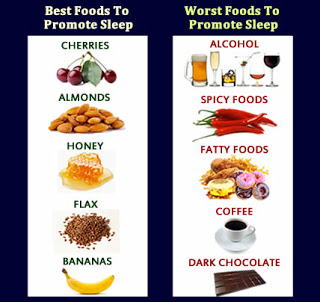The 5 Best and 5 Worst Foods For Sleep
For many, the secret to getting a good night’s sleep comes down to two things–stress and diet. It’s important to not overload your digestive system two or less hours before you sleep. Including one or two of these sleep promoting foods will help to relax tense muscles, quiet buzzing minds, and/or get calming, sleep-inducing hormones — serotonin and melatonin — flowing. On the flip side, there’s five foods to stay away from.
The Five Best
1. Cherries – Fresh, dried and tart cherries are one of the only natural food sources of melatonin, the chemical that controls the body’s internal clock to regulate sleep. Researchers who tested tart cherries and found high levels of melatonin recommend eating them an hour before bedtime or before a trip when you want to sleep on the plane.
2. Almonds – A handful of these heart-healthy nuts can send you snoozing because they contain both tryptophan and a nice dose of muscle-relaxing magnesium. They have the added benefit of supplying proteins that can help maintain a stable blood sugar level while sleeping, and help promote sleep by switching you from your alert adrenaline cycle to your rest-and-digest cycle. Try this bedtime snack: Have a tablespoon of almond butter or a 1-ounce portion of almonds to help your body relax.
3. Honey – Drizzle a little in your herbal tea. Lots of sugar is stimulating, but a little glucose tells your brain to turn off orexin, a recently discovered neurotransmitter that’s linked to alertness. Honey can promote relaxation and help ease you to sleep at night. The natural sugar found in honey raises our insulin slightly and allows tryptophan, to enter our brains more easily. Taking a spoonful of honey before bed can help you get restful sleep.
4. Flaxseeds – When life goes awry, and feeling down is keeping you up, try sprinkling 2 tablespoons of these healthy little seeds on your bedtime oatmeal. They’re rich in omega-3 fatty acids, a natural mood lifter. Many people notice that just 1 tablespoon of flaxseed oil 1 hour before bed promotes a deeper sleep. Generally, fatty acids are involved in initiating and maintaining sleep. There are different categories of fatty acids that we need: omega-3, omega-6, and omega-9 fatty acids. All three types of fatty acids play a role in sleep. Flax oil is a rich source of all three of them.
5. Bananas – They’re practically a sleeping pill in a peel. Potassium and magnesium are natural muscle relaxants, and bananas are a good source of both. They also contain the amino acid L-tryptophan, which gets converted to 5-HTP in the brain. The 5-HTP in turn is converted to serotonin (a relaxing neurotransmitter) and melatonin.
The Five Worst
1. Alcohol – Having a drink (or two) is one way to nod off more quickly, but how restful is an alcohol-induced slumber? While a nightcap may get you to doze off, you’re more likely to wake up during the night and may not feel as rested following your sleep. So although that glass of wine may help you get to sleep faster, the effect of consolidating sleep in the first half of the night is offset by having more disrupted sleep in the second half of the night which creates sleep deprivation in the long-term.
2. Spicy Foods – Research has shown over the years that a spicy meal at night can indeed lead to poor sleep. The most direct study to show this was published in The International Journal of Psychophysiology by a team of Australian researchers. On the nights that included spicy meals, there were marked changes in the subjects’ sleep patterns. They spent less time in both the light phase of sleep known as Stage 2 and the deep, slow-wave Stages 3 and 4. All of which meant that they experienced less sleep over all and took longer to drift off.
3. Fatty Foods – Research shows that people who often eat high-fat foods not only gain weight, they also experience a disruption of their sleep cycles. A heavy meal activates digestion, which can lead to nighttime trips to the bathroom. People who eat a lot of fatty foods may also have more difficulty sleeping. There seems to be a strong connection between the circadian processes, sleep and metabolism relating to the processing of fatty foods such as high-fat dairy, fried foods and fatty meats.
4. Coffee – It’s no surprise that an evening cup of coffee might disrupt your sleep. Even moderate caffeine can cause sleep disturbances. But don’t forget about less obvious caffeine sources, like, cola, tea, and decaffeinated coffee. For better sleep, cut all caffeine from your diet four to six hours before bedtime.
5. Dark Chocolate – Besides caffeine, chocolate also contains theobromine, another stimulant that can increase heart rate and sleeplessness. While dark chocolate is excellent for your health, try to avoid ingesting any chocolate 5 hours or less before bed.
